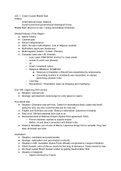Class notes
Lectures International Studies Politics in Middle East
- Course
- Institution
- Book
These are the lecture notes of Politics: MENA from 2020/2021. I made my notes and scored a 7.5 on the final. The readings are not included as I did not do them myself so I cannot help you.
[Show more]




